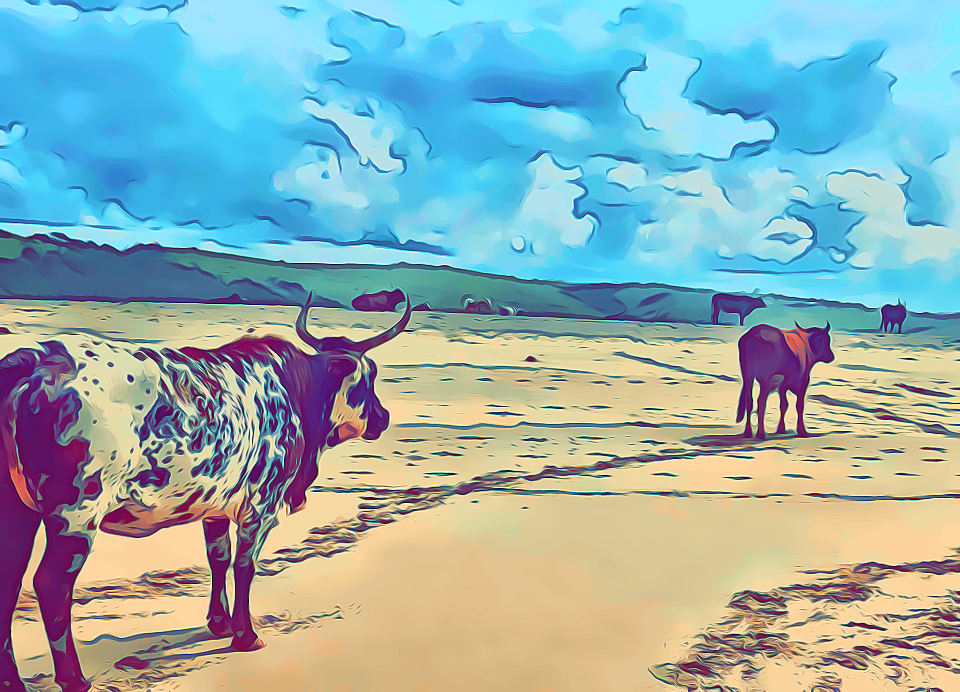Can words be art? Can they be wildly expressive, producing bold strokes of color across the canvas of our minds? Can ideas be communicated the way Van Gogh paints? The movement, the shapes, and the colors are not photorealistic, yet we recognize the beauty and truth of what he paints more profoundly than in photorealistic representations. Do our concepts always have to resemble science, or can we give our thoughts flight, allowing these deep intuitions to color beyond the lines. If ever words need to be art it is in the exploration of beauty.
Is there more to beauty than fleeting appearances? Does it have value and substance worth pursuing or is beauty simply in the eye of the beholder, an imaginative fantasy?
Let’s begin this exploration with an illustration.
This story begins in a remote area of South Africa, called the wild coast. Friends of ours invited us to join them on a five day coastal hike. We were all so ready for this adventure as it came after a long nation-wide lockdown.
Our daily routine consisted of an early morning breakfast followed by 6-8 hours of walking, swimming and chatting. Big blue skies welcomed us every morning. Most of the trail was on sandy beaches which meant we could walk barefoot most of the way. The trail also veered off over green hills and through dense portions of forest. It was an unusual feeling, knowing that there was nothing to accomplish, no work to be done, no appointments to be met. We had no laptops with us and our phones were only good for photography because there was hardly any cellular signal.
By the third day, this new rhythm of life found its way into me. We reached our destination for the day by 3pm. There were a few bungalows located next to a river-mouth and after off-loading our backpacks we went for a swim in the sea. Afterwards, as I sat on the porch of our bungalow, gratitude welled up. The landscape that spread out before me was captivating. There were so many diverse aspects to it – colors, forms and movements – yet such harmony. Even the contrasts intermingled for there was no conflict. Something was awakened in me. The previous few days prepared me for this moment. Beauty seduced me.
Why do we find beauty so alluring? Something about it finds deep resonance within us. We recognize beauty for a part of our own uninhibited selves is mirrored there. Beauty is not solely objective, neither is it exclusively in the eye of the beholder, rather, it is found in the relationship between the observer and the observed. When we contemplate beauty we cannot do so objectively, for we are implicated in the wonder we appreciate.
Now the illustration above uses visual terms, but beauty appeals to all our senses and to more than our senses. We find beauty in concepts, and in feelings too. Yet, similar to the visual landscape, there are common qualities in other forms of beauty.
- Relational Perspective.
Beauty is always found in perspectives, and different perspectives create new forms of beauty. Perspective is a relationship and relationship is a living movement, never static. Whenever a relationship becomes static, it is in the process of dying. The perfection of beauty is therefore not some ultimate changeless state or idealized goal, but rather a living movement – the continual transformation of beauty into new forms.
- Uninhibited Contrasts
There is no joy in boring sameness. Beauty rejoices in exhilarating contrasts. Yet the contrasts in beauty contains no conflict. Rather, spontaneity and uninhibited expression between these contrasts produces a paradoxical harmony. This is why we can lose ourselves in beauty, for it contains no debilitating self-consciousness. Each aspect of beauty can be fully itself, without shame and without fear.
- All-in-all Intimacy
Within the movement of beauty, the unthinkable happens: contrasts intermingle. Instead of remaining neatly in separate categories differences begin to interpenetrate one another. The deepest form of intimacy occurs as differences lose themselves in one another, yet distinction returns. All does not become one, neither does one become all, rather, beauty becomes all in all, affirming both distinction and union.
What drew the simple elements of our early universe into more complex stars? What wooed the first stars to give themselves in explosive super-novas so that planets could be born. Who seduced these new-formed elements into life? And why does life evolve into greater diversity, and greater complexity. And what continues to evoke life, to draw each day forward? Is it the gravity of beauty? Maybe beauty has more substance than what we ever imagined. Maybe the seducing movements of beauty is the mystery of God.
Can you imagine a wholeness so whole that the only way in which it can find novelty is through fragmentation; a fulness so full that its only authentic expression is in self-emptying; a completeness so complete that it can only progress by beginning anew; a love so large that it gives freedom, possibility and forgiveness in equal extravagance. a Consciousness so all-encompassing, so omni-present that it has to encapsulate parts of itself to produce unique perspectives. Such a complete, full, and whole consciousness must be fragmented into many self-conscious units in order to create a diversity of beauty from embodied perspectives.
There is a part of your consciousness that did not emerge from your individual experiences as a person, but is a participation in a larger consciousness. The unconscious is more than an individual psychological phenomenon – it is where the boundary between self and all else disappears; a point of contact with what lies beyond self. The unconscious enfolds a great depth.
Some have glimpsed this depth and tried to better define it. Carl Jung spoke about the collective unconscious. This intuitive knowledge is not personal. In other words, it was not gained through the experience of an individual but, rather, is collective and gained through the experience of the species.
Just as animals are born with instincts specific to their species, so humans inherit a pearl of intuitive wisdom. Layers of experience have accumulated through many generations to form a
pattern of knowledge. But the unconscious is deeper still. It enfolds a depth beyond intuition, beyond even the collective human history. The Scriptures locate the unconscious as the space in which God often meets with us in surprising ways. The Bible is filled with stories about dreams – unconscious events – in which wisdom is given and meaning unveiled. There is no neat boundary that we can define for the unconscious, and it might be this very lack of boundary that allows the divine to merge with our humanity. Humanity is part of the incarnation of beauty.
Your becoming is part of God’s evolution, part of the trajectory of beauty. Your experiences from your unique perspective expands the experience and memory of God and is an integral part of God’s becoming.







Having listened to my brother speak unceasingly about justice and wrath, Zoë felt depressed. I have just read this article to her and she says it made her feel excited and uplifted. This is surely the difference between our static interpretations of God and the wonderful possibilities of a God becoming? Thank you for uplifting us on a dull, grey, wet English summer’s day. 😊
Thank you dear Fiona. Zoe has such a unique appreciation for beauty that is expressed in her art. How boring changeless god must be – only the continual creation of novel forms of beauty befits a living God. We miss you!
Words of wisdom!
Thanks for sharing with us Andre.
In appreciation,
Sue
Thank you for putting into words what my heart can’t express . My heart sings when I read this .
❤️